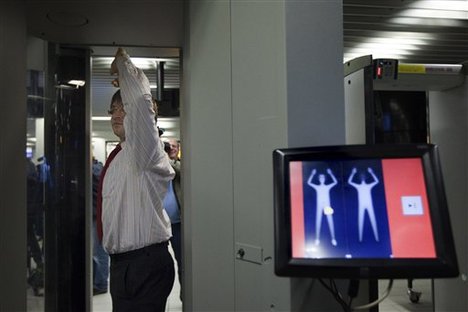
Full-body scanning at international airports has divided Muslim scholars in India, with some see the measure “haram”, while others support it for security reasons.
“No Muslim is permitted to allow it by his own will and must refuse to be scanned,” Islamic seminary Darul Uloom Deaband said in a fatwa cited by The Times of India on Tuesday, March 13.
The fatwa was issued after the request of a Britain-based Muslim, who was put through the full-body scanner at the Manchester airport.
The man said his six-year-old son and nine-year-old daughter also underwent similar checks with no prior information.
Though airport authorities said passengers had the right to have their scanned image viewed by a staff member of the same sex, they ignored this protocol with the Muslim man.
“I was furious and outraged and complained to the authorities, but was told that we would not be permitted to board the plane without the body scan,” he told theDeccan Herald.
“I also believe that my fully veiled wife would have been scanned if I had not complained strongly.”
Asking for a fatwa on the issue, Deoban seminary said it is the duty of “influential Muslims to make effort to get Muslims exempt legally from such scanning”.
“We are against body scans as it’s not only un-Islamic but goes against Indian culture,” Deoband rector Abdul Qasim Nomani told The Times of India.
“Not just Muslims, Hindus and people of other religions, too, would find it offensive if their privacy is violated.”
Founded by a group of Indian scholars in 1857, the Deoband is the most influential Muslim intellectual school of thought in South Asia.
The school, which follows that of Imam Abu Hanifah with regard to fiqh and minor issues, has thrust into the spotlight in recent years after it has issued several fatwas denouncing terrorism.
Muslims make up about 13 percent of India’s population, the third largest Islamic population after Indonesia and Pakistan.
Opposition
But Muslim scholars from another Islamic seminary opposed the fatwa.
“If scan is necessary for security reasons or to detect, treat a disease then it’s not haram or un-Islamic,” Maulana Syed Mohammad Ashraf Kichhouchhwi, general secretary of All India Ulama and Mashaikh Board, told The Times of India.
Faizan Mustafa, vice-chancellor of the National Law University in Orissa, agrees.
He said that what authorities do for the common good is allowed in Islam.
“In today’s age, when there are threats from terrorist and fundamentalist forces, how can one refuse body scans at airports?” he asked.
Britain has tightened airport security measures following a failed plot to blow up a US-bound plane on December 25, 2009.
As part of the new measures, the government has ordered full-body scanners at airports to search passengers.
The independent Equality and Human Rights Commission (EHRC) has warned that the full-body scanning of passengers at airports violates privacy laws and breaches race and religious discrimination legislation.
The Fiqh Council of North America (FCNA) also criticized the use of body scanners for security in US and European airports as a violation of religious teachings on decency in Islam and all faiths.



